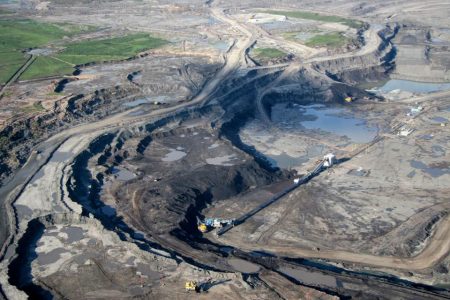March 8, 2018 – When Bill Nye, the Science Guy, met with Prime Minister Justin Trudeau to debate Canada’s climate change and energy policies, Nye brought up the Kinder Morgan TransMountain Pipeline, asking Trudeau to justify the government’s okaying of the project will staying committed to COP21. Trudeau explained there needed to be a balance between jobs and the economy and fighting climate change. Nye accepted the answer with little argument.

Was Trudeau’s answer correct?
Only if you accept status quo thinking, that the economy of Western Canada will sputter and die without putting a pipeline in place to triple the flow of bitumen to the West Coast for oversea’s markets. The pipeline itself creates short-term jobs and very few of the long-term variety. But what it does do at the bitumen production end is encourage expansion of oil sands operations along with increased carbon emissions. Then if you follow the bitumen through the pipeline to the West Coast terminal where it will be loaded onto tankers destined for Asian markets, the decision will lead to increased emissions in shipping, and emissions created by the countries receiving, refining and burning the end products.
In effect what Canada will have done is pas the carbon buck overseas, putting off the hard decision of tamping down oil sands growth and production in pursuit of a low-carbon future. But Canada and its oil and pipeline companies aren’t alone in continuing to put money down on fossil fuel projects. Energy companies and governments around the world are doing the same thing. These are countries who have signed up to COP21 objectives to keep global warming well below a 2 Celsius (3.6 Fahrenheit) rise, striving for no more than 1.5 Celsius (2.7 Fahrenheit). But through lack of policy and regulation, they aren’t meeting their promises with very few exceptions (some Pacific and Indian Ocean island nations, and Costa Rica).
Andrew Grant, Senior Analyst at Carbon Tracker, and author of a new report published today argues that governments are a long way from Paris and November 2015 when they all signed on to reduce carbon emissions to beat the 2.0 Celsius upper limit. And because the vast majority of countries are policy deficient in addressing carbon reductions, and because demand for energy across the globe remains high, the fossil fuel companies are seizing short-term opportunity to drill and build more infrastructure. The worst offenders are in the United States under the climate change denying regime of President Donald Trump. Russia is equally culpable.
Grant quantifies the risk these countries, and the fossil fuel and energy companies they continue to support, are willing to take for short-term gain in his study by looking at projected energy demand based on trends. He creates three demand curve scenarios in his analysis.
In low demand new oil and gas projects between now and 2025 expose fossil fuel and energy companies to $1.6 trillion in investment risk.
In the middle curve increases in risk grow to $3.3 trillion.
And demand at the high end increases risk exposure to $4.8 trillion.
States Grant, “At present, governments’ policies fall a long way short of the ultimate goal committed to at Paris, but we should expect a ratcheting up of international efforts. Companies that misread the signals and overinvest in marginal oil, gas and coal projects based on a false sense of security could destroy shareholder value worth billions of dollars.”
Grant points out that the amount of money companies are slated to risk, in the absence of governments enacting climate change legislation with teeth, is staggering. We are talking trillions more than the risk exposure described above. Many of the companies with risk exposure are state-owned enterprises. So countries, by not committing to enforce COP21 goals to which they have agreed, double down on the risk exposure for their nations and citizens.
Millions of shareholders who own a percentage of these oil and energy companies are now exposed to risk and will take a financial hit having been misled, not only by their governments but also by the fossil fuel and energy companies, the latter having never been regulated to report their risk exposure.
Risk by specific sub-sector is further described in the report.
- Investments in future spending on oil projects including money for new oil sands capacity represents $1.3 trillion at risk. United States exposure amounts to more than one-half trillion. Canada’s oil risk is calculated at $110 billion. The next three biggest risk exposures belong to China, Russia, and Brazil.
- Investments in future spending on gas projects represent $228 billion at risk. That includes liquefied natural gas (LNG) projects such as those being proposed for British Columbia. In gas, it is Russia that is most risk exposed to the tune of $57 billion. The United States, Qatar, Australia, Canada (the British Columbia project previously mentioned), and Norway are also into future investment risks.
- Coal is least a risk because new projects are few and far between. China and the United States represent $51 billion of $62 billion in total risk.
In light of the risk exposure identified by the study, I wonder if Prime Minister Trudeau might reconsider his comments about balancing economic and environmental goals as justification for Kinder Morgan and other oil sands’ capacity investments.















